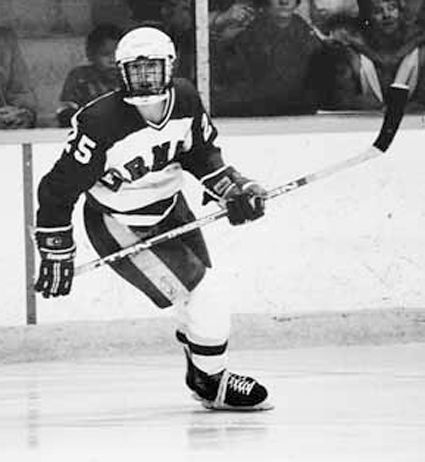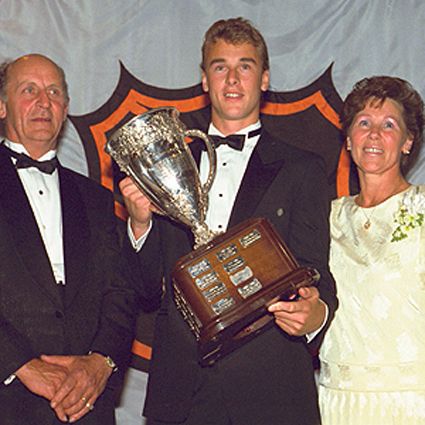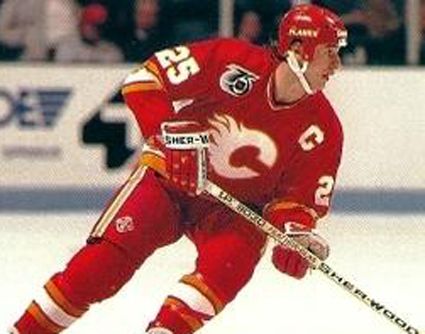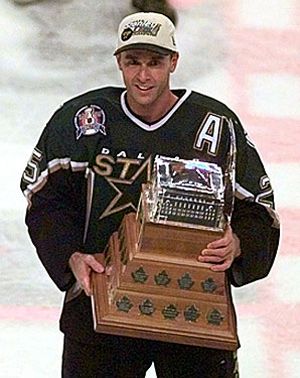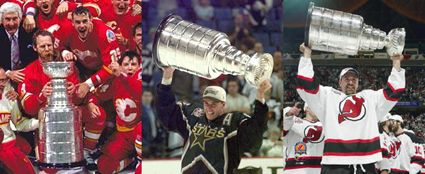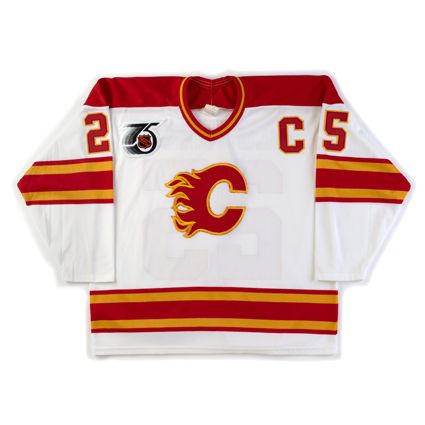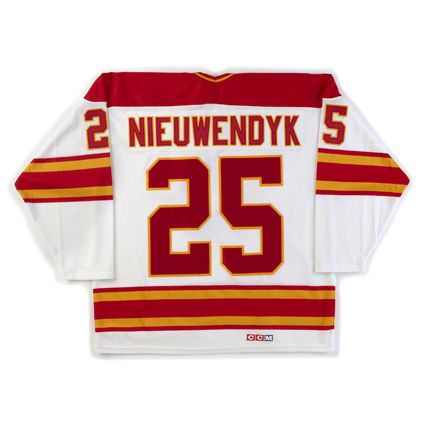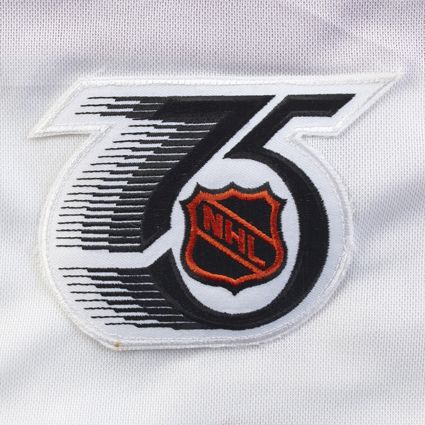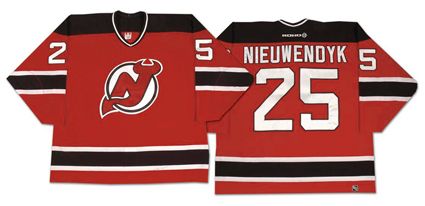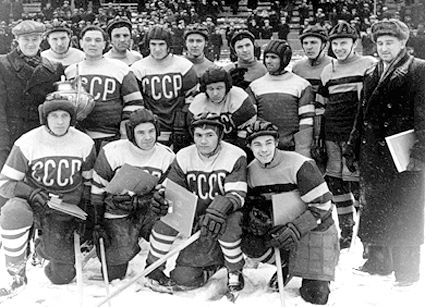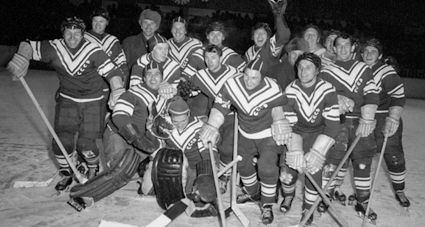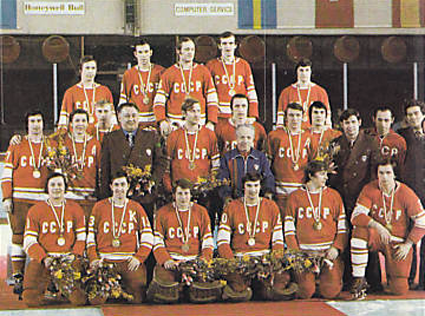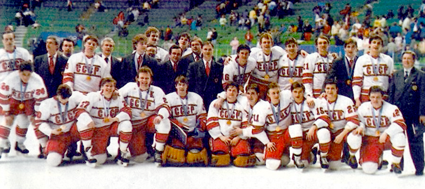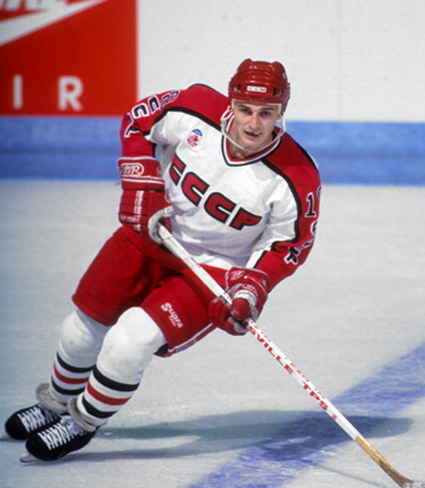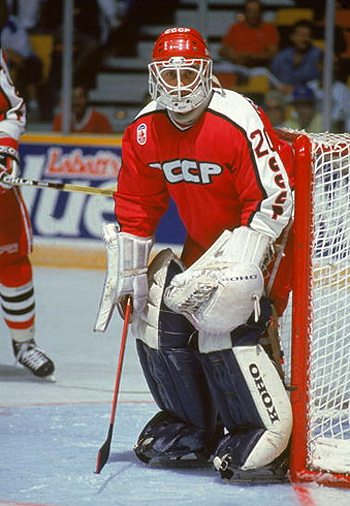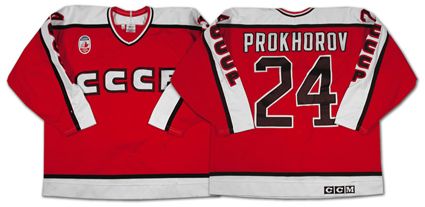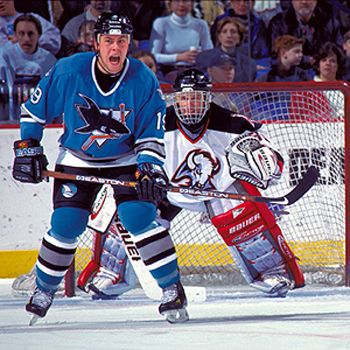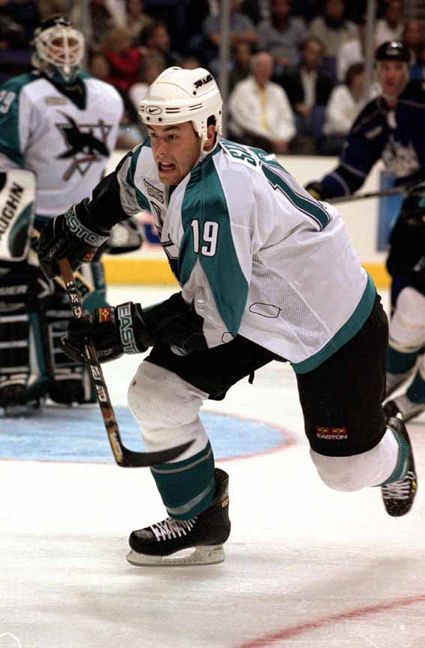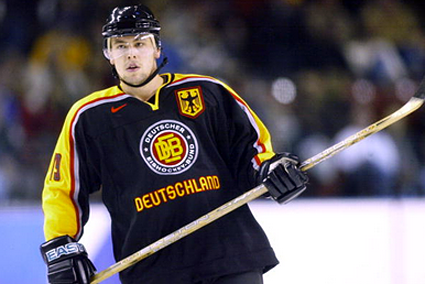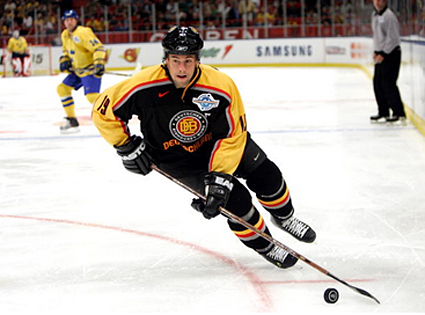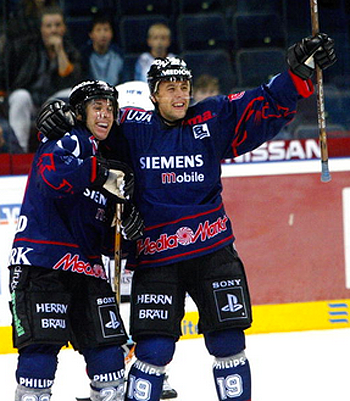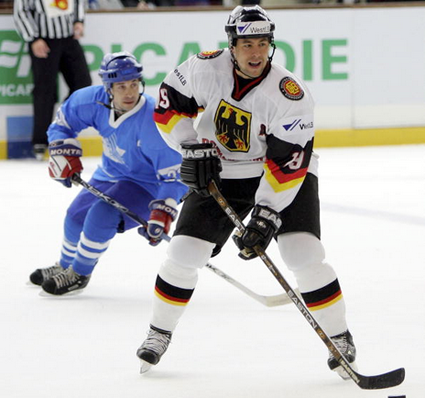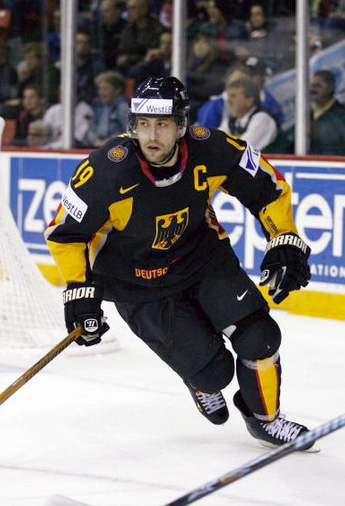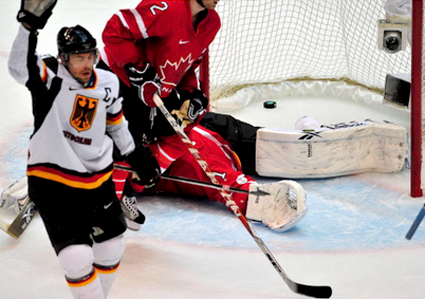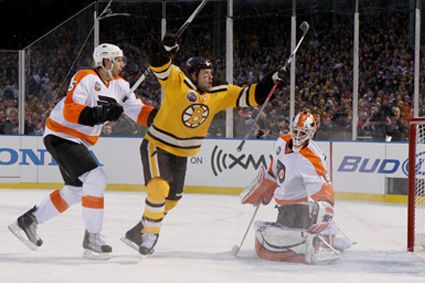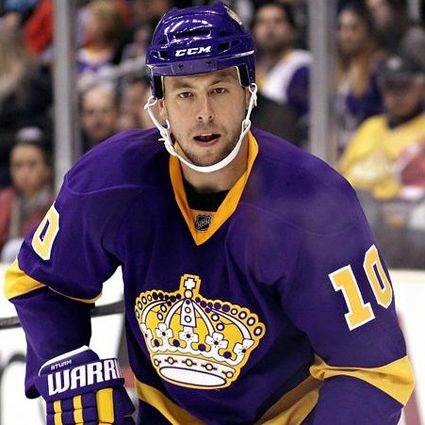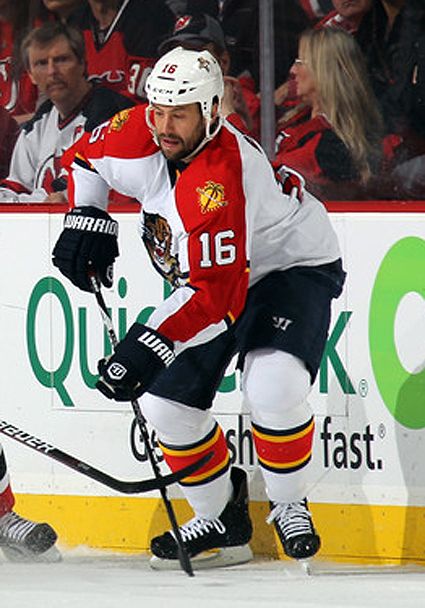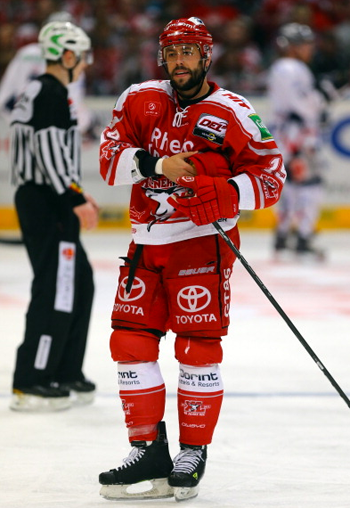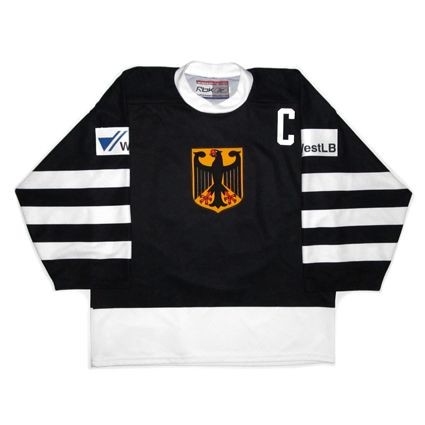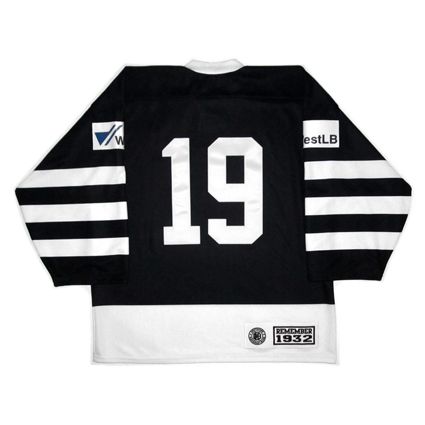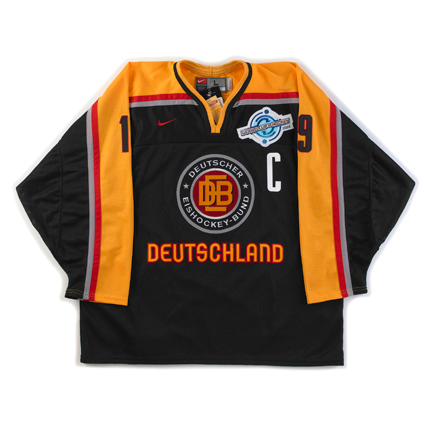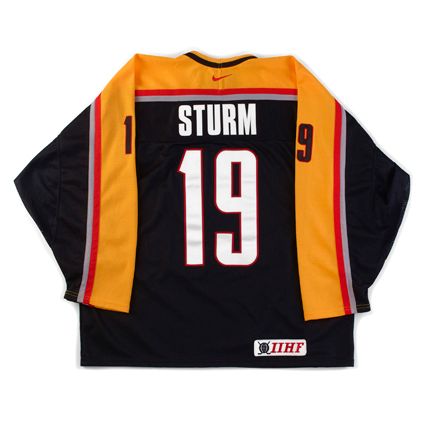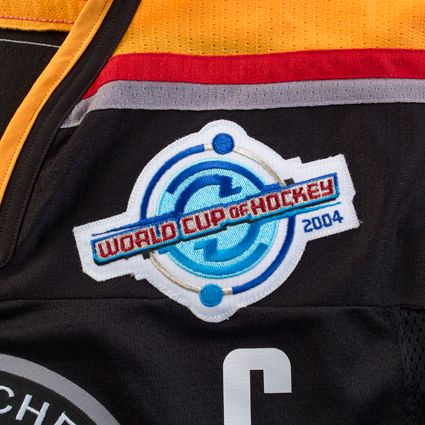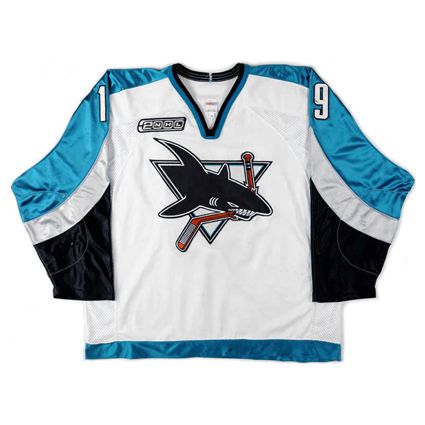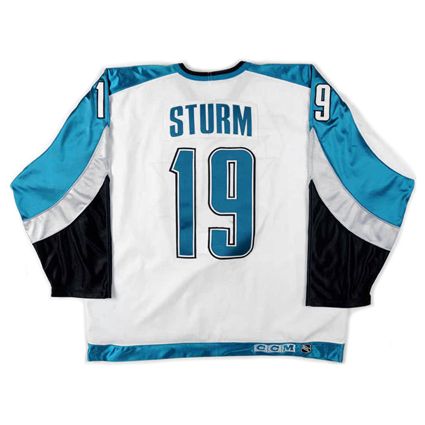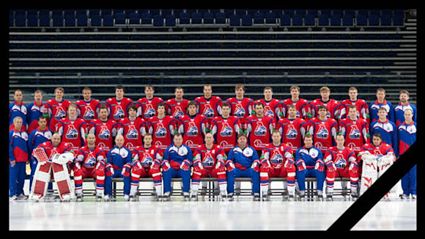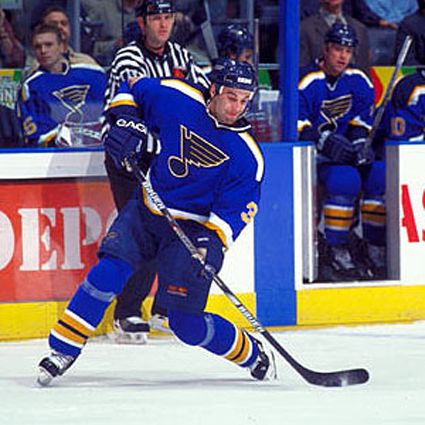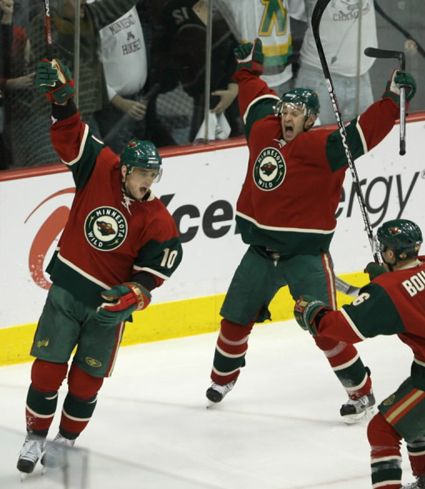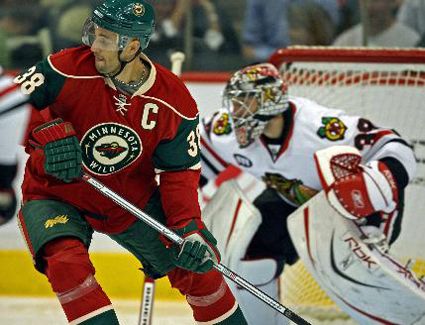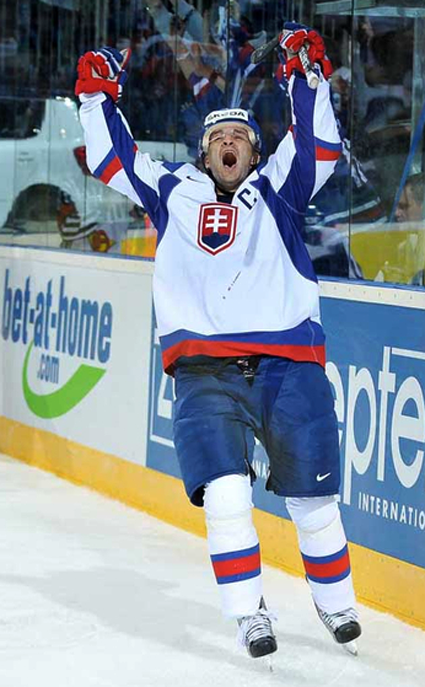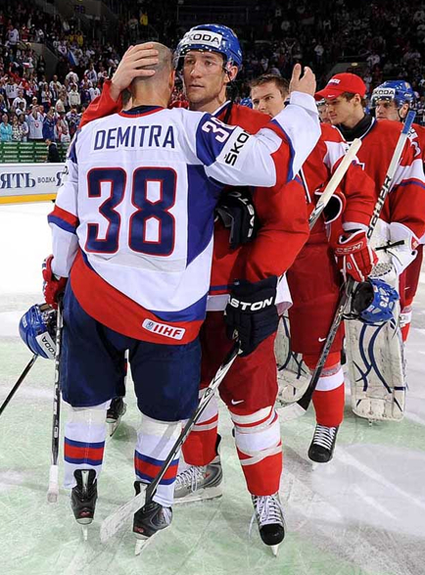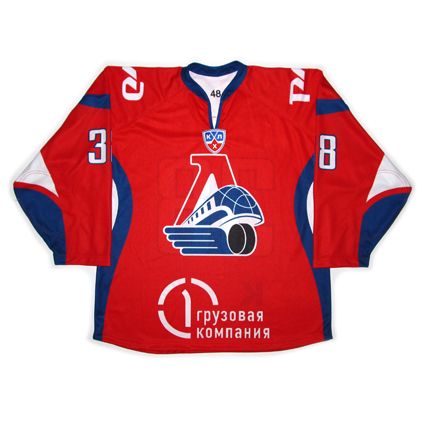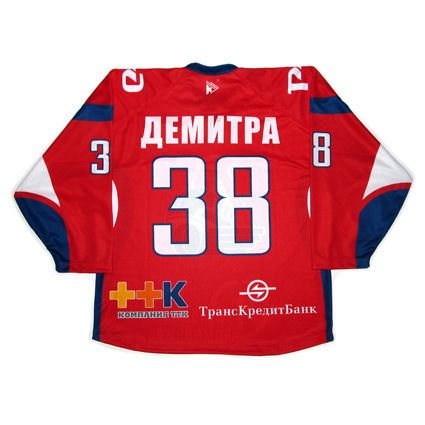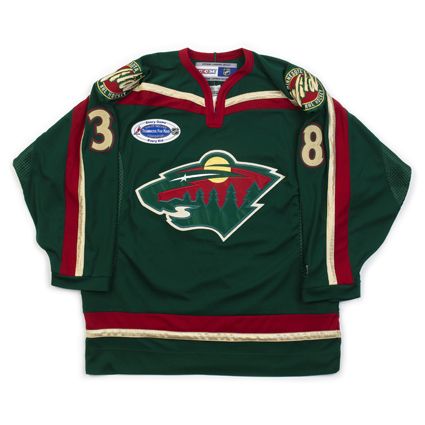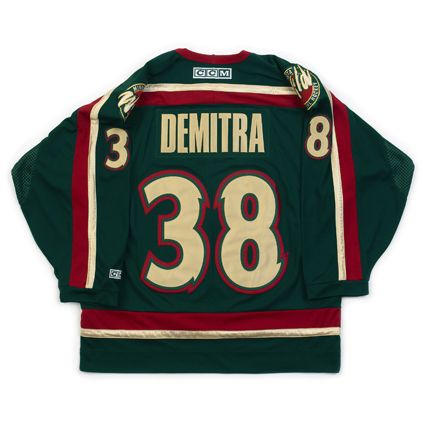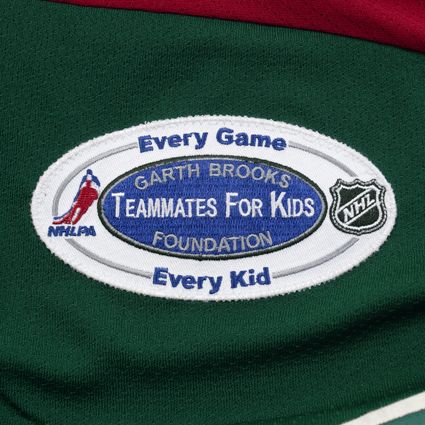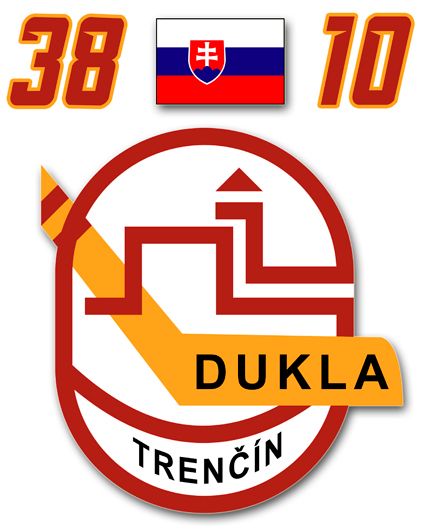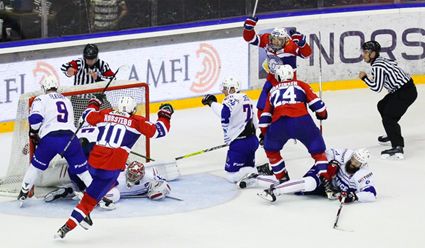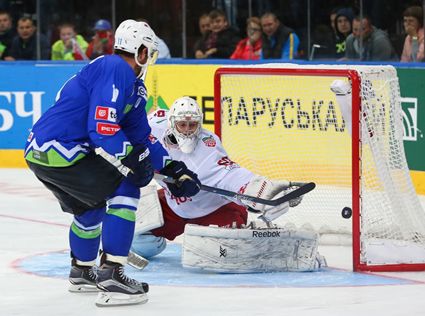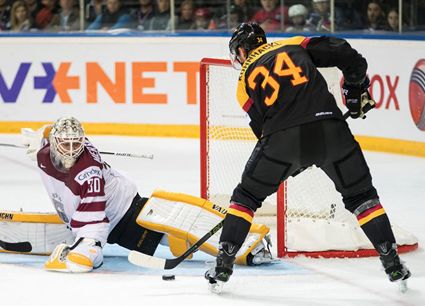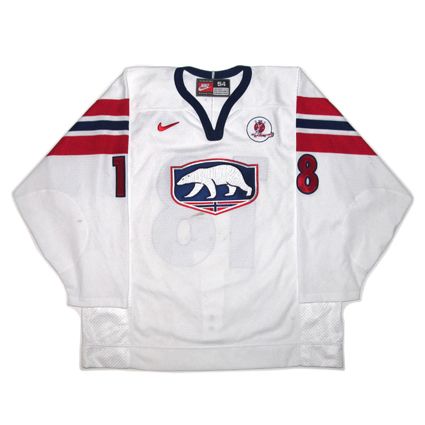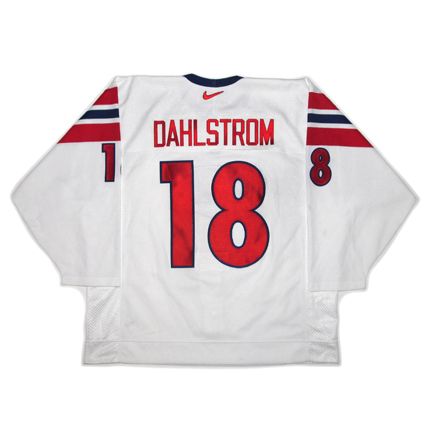Today's featured jersey is a 1991-92 Calgary Flames Joe Nieuwendyk jersey. This jersey features the captain's "C" that Joe first wore that season along with the NHL 75th Anniversary patch worn by all the teams that season.
Saturday, September 10, 2016
1991-92 Calgary Flames Joe Nieuwendyk Jersey
Born on this date in 1966, Joe Nieuwendyk played three years at Cornell University in the Eastern Collegiate Athletic Conference (ECAC), where he was named an All-American in 1986 and 1987.
He would then move onto the NHL, making his debut with the Calgary Flames, who had drafted him 27th overall in 1985. Because he played less than 25 games, he was still considered to be a rookie the following season when he scored 51 goals and was awarded the Calder Trophy.
He would match is 51 goal total the following season as the Flames would capture the Stanley Cup. Nieuwendyk would contribute 10 goals and 4 assists in 22 games during that year's playoffs.
His goal scoring would remain consistently high, as he netted 45 in each of the next two seasons, giving him a 48 goal average in his first four NHL seasons, never scoring below 45 goals in the process. He would also average 88.5 points during that time span, with his career high coming in 1989-90 when he would add 50 assists to his 45 goals for 95 points.
He became the Flames captain in 1991 was named the winner of the King Clancy Memorial Trophy in 1995, given to the player who best exemplifies leadership qualities on and off the ice and who has made a significant humanitarian contribution to his community.
Nieuwendyk would play in 9 seasons in Calgary before being dealt in 1995 to the Dallas Stars where he would play for seven seasons, with his best point total coming in 1997-98 when he would score 39 goals and 30 assists for 69 points.
Aside from personal best point totals, the highlight of Nieuwendyk's time in Dallas was capturing his second Stanley Cup and being named with winner of the Conn Smythe Trophy as the most valuable player in the 1999 playoffs.
Conn Smythe trophy winner Joe Nieuwendyk
Near the end of the 2001-02 season Joe would be dealt to the New Jersey Devils, where he would win his third Stanley Cup in 2003.
That victory would place Nieuwendyk in the unique position of having won the Stanley Cup three times in three different decades as a member of three different teams, with championships in Calgary in 1989, Dallas in 1999 and New Jersey in 2003.
His career would wind down with one season with the Toronto Maple Leafs before moving to the Florida Panthers for one full season and 15 games of a second before retiring with 564 goals and 562 assists for 1,126 points in 20 NHL seasons, placing him in the top 50 in NHL history at the time of his retirement.
In addition to his NHL career, Nieuwendyk would also play in tournaments for Canada on four occasions. in 1986 he would win silver at the World Junior Championship, he would participate at the World Championships in 1990 and play in the Olympics twice, first in 1998 in Nagano, Japan and then earn a gold medal in 2002 in Salt Lake City.
Today's featured jersey is a 1991-92 Calgary Flames Joe Nieuwendyk jersey. This jersey features the captain's "C" that Joe first wore that season along with the NHL 75th Anniversary patch worn by all the teams that season.
Today's featured jersey is a 1991-92 Calgary Flames Joe Nieuwendyk jersey. This jersey features the captain's "C" that Joe first wore that season along with the NHL 75th Anniversary patch worn by all the teams that season.
Calgary would continue to wear this style jersey through the 1993-94 season until it was replaced after 14 seasons.
Bonus jersey: Today's bonus jersey is a 2002-03 New Jersey Devils Joe Nieuwendyk jersey. This style of Devils jersey was adopted for the 1992-93 season when the Devils dropped the color green from their color set and has remained unchanged ever since. In addition, the Devils, led by team president and general manager Lou Lamoriello, have resisted the adaptation of an alternate jersey and if he has his way, the Devils will still be wearing this same jersey unchanged 100 years from now.
Here are some highlights of Joe and Flames winning the Stanley Cup in 1989.
Here Joe makes a really nice move around Kevin Weeks to score his 500th career goal in style.
Next is a retrospective of Joe's career from ESPN.
Here is a highlight reel of Nieuwendyk's time with the Dallas Stars, highlighting his goal scoring ability.
Labels:
Calgary Flames,
New Jersey Devils,
Nieuwendyk Joe
Friday, September 9, 2016
1991 Soviet Union Vitali Prokhorov Jersey
On this day in 1991 the end of an era arrived as the Soviet Union National Team played their final game in a major international tournament.
The Soviets announced their arrival on the international hockey scene in fine style (while wearing blue jerseys!), taking the gold medal home from the 1954 World Championships in their first attempt. The Soviets had only started playing ice hockey in 1946 and stunned the hockey world with their 7-2 victory over Canada in the final.
After a silver medal in the 1955 World Championships, the Soviet Union claimed it's first Olympic gold medal in 1956 with a perfect 7-0 record.
After a string of silver and bronze medals from 1957 to 1961, the era of Soviet dominance swung into high gear with ten consecutive gold medals from 1963 to 1972, which included a trio of consecutive Olympic golds in 1964, 1968 and 1972. Their run was interrupted by a silver at the 1972 World Championships before reeling off another four straight from the 1973 World Championships to the 1976 Olympics.
Five more World Championship titles followed from 1978 to 1983 and their sixth Olympic gold in eight tries in 1984. The final chapter of the Soviet National team saw them win the World Championships in 1986, the Olympics in 1988 and their final two Worlds in 1989 and 1990, the last gold medal for the Soviet Union National Team.
With the political landscape at home undergoing a historic upheaval, the Soviet Union was unsure if they would even send a team to compete in the 1991 Canada Cup, but they eventually took part. Having suffered the loss of young star Alexander Mogilny to defection and players such as Slava Fetisov, Vyacheslav Bykov, Andrei Khomutov, Pavel Bure and Vladimir Konstantinov all unavailable due to commitments with professional clubs in the NHL and Europe, Evgeny Davydov left off the squad for refusing to sign a contract with the Red Army club team, and the refusal of Latvian goaltender Arturs Irbe to play for the Soviet National Team any further for personal political reasons, the Soviets did eventually decided to field a team just a few weeks before the tournament.
The Soviets set the tone for their tournament with an opening 5-2 loss to Czechoslovakia. A 3-2 loss to Sweden followed before showing signs of life when they pounded Finland 6-1. A 2-1 loss to the United States put their participation in peril.
With one playoff round berth remaining up for grabs, Czechoslovakia, Sweden and the Soviet Union were tied at 2 points apiece with a single game remaining. Before the Soviets could even take to the ice, Sweden defeated Czechoslovakia, knocking the Soviet Union out of the upcoming playoff round.
In their final game, the best they could hope for was to deny Canada the top seed going forward. Ravil Khaidarov scored for the Soviets at 3:13 of the first, but the period ended even when Canada scored at 14:47 on the power play.
Andrei Kovalenko scored unassisted at 7:46 followed but Canada's Bill Ranford stopped Vitali Prokhorov from converting a penalty shot less than a minute to give Canada a boost by keeping the score at 2-1.
Steve Larmer evened the score for Canada at 7:15 of the third following a penalty to Soviet goaltender Mikhail Shtalenkov. Alexander Semak put the Soviet Union back on top with under seven minutes to play, but Canada's Brent Sutter tied the game with 5:18 to play.
The game would remain tied at the end, giving Canada the top spot in the Round Robin stage and bring a quiet end to the history of the Soviet Union National Team following 37 years of excellence.
From 1954 to the 1991 Worlds, the Soviet Union took home a medal in every World Championship and Olympic Games, a streak of 39 out of 40. The only time they do not appear on the podium is 1962 when they did not participate due to international politics outside of the sporting world.
In addition to the World Championships and Olympics, the Soviets won the championship in 1981, placed second in 1987 and third in 1976, lost in the semifinal in 1984 in the first four Canada Cup tournaments.
Today's featured jersey is a 1991 Soviet National Team Vitali Prokhorov jersey. This style was a huge departure from the minimalist Soviet designs of the past. Prior to the 1991 Canada Cup, the vast majority of Soviet jerseys were simple red jerseys with a few basic white stripes and one color white numbers adorned with "CCCP" across the chest in a very basic font.
Just the addition of yellow accents and running the CCCP logo at an upwards diagonal by Tackla in the 1989 was considered flashy by Soviet standards.
The addition of the bold use of black, the stylized font used for the CCCP logo and the full length sleeve stripes made for an arresting look which seemed more at home in the NHL, while still retaining the intimidating look of The Big Red Machine, even if the team's roster had changed.
There was an early prototype of this jersey made with an even more arresting hammer and sickle logo, but that style was never used in competition but remains available in replica versions, and is in fact much more commonly found that the actual 1991 Canada Cup game worn version featured here.
photo courtesy of Classic Auctions
Our video section today begins with a tribute to Soviet hockey history and their many successes.
Next, classic Soviet hockey footage is shown as Igor Larionov's daughters Alyonka and Diana sing Ave Maria prior to a legends game outdoors in Moscow's Red Square.
Labels:
1991 Canada Cup,
Soviet Union
Thursday, September 8, 2016
2008 Germany National Team Marco Sturm Jersey
Born on this date in 1978, German Marco Sturm began his path to the NHL with the EV Landshut Jr. team the 1993-94 season. That same season he made his international debut for the Germany National Team during the 1994 European Junior Championships. He would play one more season for the Landshut juniors as well as playing in not only the European Juniors, but also the 1995 World Junior Championships.
He moved up to the Landshut senior team for the 1995-96 season, scoring 12 goals and 32 points in 47 games. At age 19, Sturm was still eligible as a junior and again competed in both the European Juniors, leading all players in scoring with 11 points in 5 games as the team captain, and the World Juniors, scoring 4 goals and 10 points in 6 games for Germany.
Later that year, Sturm was selected by the San Jose Sharks 21st overall in the first round of the 1996 NHL Entry Draft, one of only two players selected in the first round to go on to be an NHL All-Star.
The 1996-97 season was Sturm's second with the Landshut senior team, this time scoring 16 goals and 43 points in 46 games. Following the DEL season, Sturm made his senior international debut at the 1997 World Championships, scoring a goal and 2 points for the Germans.
Sturm then signed with the Sharks and made the team out of training camp, scoring a goal in his first NHL game on October 4, 1997. He would finish the season with 10 goals and 30 points in 74 games, fifth among rookies and quickly established himself as an NHL regular. He would also make his Olympic debut during that season when he competed in two games for Germany at the 1998 Olympics in Nagano, Japan.
He would play the next six seasons with the Sharks, scoring 38, 27 and 32 points from 1998-99 to 2000-01, with a high of 16 goals in 1998-99. That same season he would be named to the World All-Star Team for the NHL All-Star Game. Following the 2000-01 season, Sturm would return to the World Championships for the first time since 1997, scoring 4 goals and 5 points in 7 games.
His first of six consecutive 20 goal season would arrive in 2001-02 with 21 goals on his way to 4 points. Sturm would also return to the Olympics for the 2002 Games in Salt Lake City.
He would set new personal bests with 28 goals and 48 points in 2002-03 and achieve another 20 goal, 40 point season in 2003-04. Later that fall, Sturm was a member of the German National Team at the 2004 World Cup of Hockey where he contributed 2 goals in 4 games.
Following the World Cup, the owners locked out the players in a bitter labor dispute, which resulted in the entire 2004-05 NHL season being cancelled. As many NHL players did, Sturm returned to his home country and played with ERC Ingolstadt while hoping the NHL season would resume at any time. Eventually, he played 45 games, scoring 22 goals and 38 points for Ingolstadt as well as playing in the DEL All-Star Game.
Sturm returned to the Sharks for the start of the 2005-06 NHL season, but after 23 games, he was part of a blockbuster trade, which sent him, Brad Stuart and Wayne Primeau to the Boston Bruins for their captain Joe Thornton. When Strum left the Sharks, he was ranked sixth in franchise scoring.
After scoring 6 goals and 16 points for San Jose, Sturm would settle right in with the Bruins and add another 23 goals and 43 points in 51 games in Boston, all of which added up to career highs with 29 goals and 59 points. During the season, Sturm was named as the captain for Germany for the 2006 Olympics in Torino, Italy, but was unable to compete due to an injury he suffered in early February.
He was healthy enough to return to the Bruins and, following the regular season, played for Germany at the 2006 Division I Group A World Championships, where he scored 4 goals and 7 points in 5 games as Germany earned the promotion back to the top level of the IIHF World Championships for 2007 with a perfect 5-0 record, as Germany dominated with 34 goals scored while only allowing 4 as they shut out Japan, Great Britain and France.
Sturm had another fine season with the Bruins, where his speed served him well, scoring 27 goals and 44 points, while his defensive play made him a tough opponent to compete against. He matched his 27 goals again in 2007-08, but recorded 29 assists for 56 points, the second highest of his career. Following the Bruins exit from the playoffs, Sturm played in his fourth and final World Championships with 2 goals and 3 points in 6 games while serving as the team captain.
He missed the majority of the 2008-09 season due to a knee injury, which limited him to 19 games. Sturm rebounded with a 22 goal, 37 point season, seeing action in 76 games of the 2009-10 season, proving he was fully recovered from his knee problems. Additionally, Sturm was again named the captain of the German Olympic Team for the 2010 Olympics in Vancouver, where he played in his third Olympic Games.
Unfortunately, Sturm was hurt 21 seconds into the Bruins second round playoff series against the Philadelphia Flyers, which resulted in a tear to his ACL and MCL which caused him to miss nearly half of the following 2010-11 season.
With his recovery nearly complete, Sturm was traded by Boston to the Los Angeles Kings. Ten days later he was activated from injured reserve. He scored 5 goals and 9 points in 17 games for the Kings, but was placed on waivers in late February. The following day he was claimed by the Washington Capitals, scoring a goal and 7 points in 18 regular season games before adding a goal and 3 points in 9 playoff games.
Now a free agent, Sturm signed with the Vancouver Canucks, hoping they would return to the Stanley Cup Finals, but after just six games and no points, he was traded to the Florida Panthers, with whom he played in the final 42 games of his NHL career.
For the 2012-13 season, Sturm returned to Germany to play for the Cologne Sharks in February in time to play 5 regular season games and 12 playoff games, during which he scored 6 goals and 9 points in what would be he his final games before his retirement as a player.
In 2015, Sturm was named the Head Coach and General Manager of the Germany National Team, which recently won their Final Olympic Qualifying Tournament to return to the Olympics in 2018 after missing out on the Game in 2014.
Sturm's final NHL totals were 938 games played with 242 goals and 245 assists for 487 points. He also scored 22 points in 68 NHL playoff games. Internationally, he played for Germany at the European Juniors twice, the World Juniors twice, the World Championships four times, the World Cup once and the Olympics three times.
Today's featured jersey is a 2008 Germany National Team Marco Sturm jersey. The IIHF celebrated it's 100th anniversary in 2008 and for that year's World Championships, all teams wore a throwback jersey for one game. For Germany, their design was based on their sweaters from 1932 and was worn during a 5-1 loss to Finland on May 3, 2008.
Bonus jersey: Today's bonus jersey is a 2004 Germany National Team Marco Sturm jersey. Germany first wore this style in 2001 and continued to wear it through the 2004 World Cup before it was replaced by a new style for the 2005 World Championships.
Extra bonus jersey: Today's extra bonus jersey is a 1999-00 San Jose Sharks Marco Sturm jersey. After the Sharks introduced the color teal to the NHL in 1991, they debuted a new, bold template with with arched striping as their alternate jersey first introduced in 1997-98.
The following season that third jersey became their new primary road jersey which prompted the need for a white home version. This paring was used through the 2006-07 season when it was retired with the debut of the new Reebok Edge jerseys for the 2007-08 season.
Today's video section begins with Sturm scoring the Game 6 overtime goal against the Montreal Canadiens in the 2008 playoffs.
If that wasn't enough, here are all 29 of Sturm's goals from the 2005-06 season in chronological order.
One more Sturm goal, this his overtime game winner in the 2010 NHL Winter Classic.
He moved up to the Landshut senior team for the 1995-96 season, scoring 12 goals and 32 points in 47 games. At age 19, Sturm was still eligible as a junior and again competed in both the European Juniors, leading all players in scoring with 11 points in 5 games as the team captain, and the World Juniors, scoring 4 goals and 10 points in 6 games for Germany.
Later that year, Sturm was selected by the San Jose Sharks 21st overall in the first round of the 1996 NHL Entry Draft, one of only two players selected in the first round to go on to be an NHL All-Star.
Sturm broke into the NHL with the Sharks
The 1996-97 season was Sturm's second with the Landshut senior team, this time scoring 16 goals and 43 points in 46 games. Following the DEL season, Sturm made his senior international debut at the 1997 World Championships, scoring a goal and 2 points for the Germans.
Sturm then signed with the Sharks and made the team out of training camp, scoring a goal in his first NHL game on October 4, 1997. He would finish the season with 10 goals and 30 points in 74 games, fifth among rookies and quickly established himself as an NHL regular. He would also make his Olympic debut during that season when he competed in two games for Germany at the 1998 Olympics in Nagano, Japan.
He would play the next six seasons with the Sharks, scoring 38, 27 and 32 points from 1998-99 to 2000-01, with a high of 16 goals in 1998-99. That same season he would be named to the World All-Star Team for the NHL All-Star Game. Following the 2000-01 season, Sturm would return to the World Championships for the first time since 1997, scoring 4 goals and 5 points in 7 games.
His first of six consecutive 20 goal season would arrive in 2001-02 with 21 goals on his way to 4 points. Sturm would also return to the Olympics for the 2002 Games in Salt Lake City.
Sturm during the 2002 Olympics
He would set new personal bests with 28 goals and 48 points in 2002-03 and achieve another 20 goal, 40 point season in 2003-04. Later that fall, Sturm was a member of the German National Team at the 2004 World Cup of Hockey where he contributed 2 goals in 4 games.
Sturm competed for Germany at the 2004 World Cup
Following the World Cup, the owners locked out the players in a bitter labor dispute, which resulted in the entire 2004-05 NHL season being cancelled. As many NHL players did, Sturm returned to his home country and played with ERC Ingolstadt while hoping the NHL season would resume at any time. Eventually, he played 45 games, scoring 22 goals and 38 points for Ingolstadt as well as playing in the DEL All-Star Game.
Sturm returned to the Sharks for the start of the 2005-06 NHL season, but after 23 games, he was part of a blockbuster trade, which sent him, Brad Stuart and Wayne Primeau to the Boston Bruins for their captain Joe Thornton. When Strum left the Sharks, he was ranked sixth in franchise scoring.
After scoring 6 goals and 16 points for San Jose, Sturm would settle right in with the Bruins and add another 23 goals and 43 points in 51 games in Boston, all of which added up to career highs with 29 goals and 59 points. During the season, Sturm was named as the captain for Germany for the 2006 Olympics in Torino, Italy, but was unable to compete due to an injury he suffered in early February.
He was healthy enough to return to the Bruins and, following the regular season, played for Germany at the 2006 Division I Group A World Championships, where he scored 4 goals and 7 points in 5 games as Germany earned the promotion back to the top level of the IIHF World Championships for 2007 with a perfect 5-0 record, as Germany dominated with 34 goals scored while only allowing 4 as they shut out Japan, Great Britain and France.
Sturm had another fine season with the Bruins, where his speed served him well, scoring 27 goals and 44 points, while his defensive play made him a tough opponent to compete against. He matched his 27 goals again in 2007-08, but recorded 29 assists for 56 points, the second highest of his career. Following the Bruins exit from the playoffs, Sturm played in his fourth and final World Championships with 2 goals and 3 points in 6 games while serving as the team captain.
He missed the majority of the 2008-09 season due to a knee injury, which limited him to 19 games. Sturm rebounded with a 22 goal, 37 point season, seeing action in 76 games of the 2009-10 season, proving he was fully recovered from his knee problems. Additionally, Sturm was again named the captain of the German Olympic Team for the 2010 Olympics in Vancouver, where he played in his third Olympic Games.
Unfortunately, Sturm was hurt 21 seconds into the Bruins second round playoff series against the Philadelphia Flyers, which resulted in a tear to his ACL and MCL which caused him to miss nearly half of the following 2010-11 season.
With his recovery nearly complete, Sturm was traded by Boston to the Los Angeles Kings. Ten days later he was activated from injured reserve. He scored 5 goals and 9 points in 17 games for the Kings, but was placed on waivers in late February. The following day he was claimed by the Washington Capitals, scoring a goal and 7 points in 18 regular season games before adding a goal and 3 points in 9 playoff games.
Now a free agent, Sturm signed with the Vancouver Canucks, hoping they would return to the Stanley Cup Finals, but after just six games and no points, he was traded to the Florida Panthers, with whom he played in the final 42 games of his NHL career.
For the 2012-13 season, Sturm returned to Germany to play for the Cologne Sharks in February in time to play 5 regular season games and 12 playoff games, during which he scored 6 goals and 9 points in what would be he his final games before his retirement as a player.
Sturm's final season was with the Cologne Sharks
In 2015, Sturm was named the Head Coach and General Manager of the Germany National Team, which recently won their Final Olympic Qualifying Tournament to return to the Olympics in 2018 after missing out on the Game in 2014.
Sturm's final NHL totals were 938 games played with 242 goals and 245 assists for 487 points. He also scored 22 points in 68 NHL playoff games. Internationally, he played for Germany at the European Juniors twice, the World Juniors twice, the World Championships four times, the World Cup once and the Olympics three times.
Today's featured jersey is a 2008 Germany National Team Marco Sturm jersey. The IIHF celebrated it's 100th anniversary in 2008 and for that year's World Championships, all teams wore a throwback jersey for one game. For Germany, their design was based on their sweaters from 1932 and was worn during a 5-1 loss to Finland on May 3, 2008.
Bonus jersey: Today's bonus jersey is a 2004 Germany National Team Marco Sturm jersey. Germany first wore this style in 2001 and continued to wear it through the 2004 World Cup before it was replaced by a new style for the 2005 World Championships.
Extra bonus jersey: Today's extra bonus jersey is a 1999-00 San Jose Sharks Marco Sturm jersey. After the Sharks introduced the color teal to the NHL in 1991, they debuted a new, bold template with with arched striping as their alternate jersey first introduced in 1997-98.
The following season that third jersey became their new primary road jersey which prompted the need for a white home version. This paring was used through the 2006-07 season when it was retired with the debut of the new Reebok Edge jerseys for the 2007-08 season.
Today's video section begins with Sturm scoring the Game 6 overtime goal against the Montreal Canadiens in the 2008 playoffs.
If that wasn't enough, here are all 29 of Sturm's goals from the 2005-06 season in chronological order.
One more Sturm goal, this his overtime game winner in the 2010 NHL Winter Classic.
Labels:
Germany,
San Jose Sharks,
Sturm Marco
Wednesday, September 7, 2016
2010-11 Lokomotiv Yaroslavl Pavol Demitra Jersey
Today marks the fifth anniversary of the crash on takeoff of the jet carrying the Russian club Lokomotiv Yaroslavl to what was supposed to be their season opening game. The crash killed 43 of the 45 people on board, taking the lives of all but one of the players, Alexander Galimov, who succumbed to his injuries five days later, and all of the other team personnel on the flight. The only other survivor of the crash was a member of the plane's crew.
"At first we didn't want to believe it. But right now there is no hope. The team is gone," a Lokomotiv team official told the Russian news outlet Sovietsky Sport.
The catastrophe claimed the lives of players and coaches from Belarus, Canada, the Czech Republic, Germany, Latvia, Russia, Slovakia, Sweden and Ukraine, shaking the hockey community worldwide.
Among those familiar to fans of the NHL were assistant coach and 12 year NHL veteran and multiple Soviet and Russian league champion Russian Igor Korolev, eight year NHL veteran and World Championship gold medal winner Czech Karel Rachunek, Stanley Cup and World Championship gold medal winner Czech Josef Vasicek, 11 year NHL veteran, owner of the NHL's longest playing streak for a defenseman and Latvian National Team mainstay Karlis Skrastins, 12 year NHL veteran, World Championship gold medal winner and one of the first four Russians to have his name engraved on the Stanley Cup, assistant coach Alexander Karpovtsev, 14 year NHL veteran, with 917 games played, and Belarus National Team leader Ruslan Salei, 18 year NHL veteran of 1,222 games and Stanley Cup winner and team head coach Canadian Brad McCrimmon.
Russian Alexander Vasyunov had played two seasons with the Lowell Devils of the AHL and 18 games with the New Jersey Devils last season and German Robert Dietrich spent two seasons in North America in the Nashville Predators system with the AHL's Milwaukee Admirals,
Czech Jan Marek led the KHL in goal scoring in 2008-09 and was a World Championship gold medal winner in 2010. Sweden was hit hard by the loss of goaltender Stefan Liv, a three time Swedish Elitserien champion with HV71, and World Championship gold medal and Olympic gold medal champion, both coming in Sweden's historic double of 2006. The Polish born Liv also played in North America with the Grand Rapids Griffins of the AHL in 2006-07.
One of the highest profile names to perish in the crash was Slovak star Pavol Demitra. Demitra began his professional career with two seasons in the Czechoslovak league before moving to North America following his being drafted 227th overall by the Ottawa Senators. He would split three seasons between the NHL's senators and their top minor league affiliate, the Prince Edward Island Senators from 1993-94 to 1995-96.
Demitra played for the Las Vegas Thunder and Grand Rapids Griffins of the IHL as well as eight games with the St. Louis Blues following a trade. he found his greatest success with St. Louis, with three seasons of 35 goals or more, including a high of 37 in 1998-99, the year of his first NHL All-Star Game appearance. Two more All-Star appearances would follow in 2000 and 2002 before Demitra would set a career high in points with 93 in 2002-03, placing 6th overall in the league scoring race. In all, Demitra would lead St. Louis in scoring four times, in 1999, 2000, 2002 and 2003.
He would also be recognized with with the Lady Byng Trophy in 2000 after recording 28 goals and 75 points with just eight penalty minutes.
He returned to Slovakia during the NHL lockout of 2004-05 to once again play for Dukla Trencin. Once the NHL resumed play, the free agent Demitra signed to play for the Los Angeles Kings for one season prior to being traded to the Minnesota Wild to be teamed with fellow Slovak and close friend Marian Gaborik. for the 2006-07 and 2007-08 seasons.
Demitra tied for the team lead in scoring during his first season in Minnesota despite Gaborik missing nearly half the season due to injury. While with the Wild, Demitra served as team captain during October of 2007.
His final two NHL seasons were spent with the Vancouver Canucks, although the second was limited to 28 games following a lengthy recovery from off-season shoulder surgery.
His NHL career concluded with 847 games played, 304 goals and 464 points for 768 points. Additionally, in 94 career playoff games, Demitra scored 23 goals and 59 points.
For the 2010-11 season, Demitra signed with Lokomotiv of the KHL in Russia, where hisrenowned playmaking abilities made the veteran the club's leading scorer and placed him in a tied for third in league scoring.
Internationally, Demitra played in the 1992 European Junior Championships and the 1993 World Junior Championships, winning a bronze medal, for Czechoslovakia. Following the division of Czechoslovakia, Demitra skated for Slovakia in both the 1996 World Championships and 1996 World Cup, the 2002 Olympics and 2003 World Championships where he earned a bronze medal.
He then went on to participate in both the 2004 World Championships and 2004 World Cup, the 2005 World Championships, 2006 Winter Olympics and 2007 World Championships.
Demitra then led all players at the 2010 Olympics in scoring with ten points in seven games on his way to being named a tournament all-star. He also scored a sublime shootout goal to give Slovakia a win over Russia in the preliminary round.
His final international appearance was as the 2011 World Championships, where he had the honor of captaining the Slovak team on home ice.
Here, Demitra and future Lokomotiv teammate Rachunek embrace following their preliminary round game at the 2011 World Championships.
Demitra leaves behind his wife Maria and his two children, Lucas and Zara.
Today's featured jersey is a 2010-11 Lokomotiv Yaroslavl Pavol Demitra jersey as worn during Demitra's final season of play during which he scored 18 goals and 60 points in 54 games, which placed him fifth in league scoring. During the postseason, Demitra scored another 6 goals and 21 points for second in KHL playoff scoring.
The name Lokomotiv comes from the fact the club is owned by the Russian national railroad, Russian Railways. The club was founded back in 1959 and has won the Russian Open Championship three times (1997, 2002 and 2003), and were KHL runner's up twice (2008 and 2009) and were also runner's up in the 2003 IIHF Continental Cup.
Following the crash, the club fielded a team of young players in the VHL, the second level of Russian hockey, but will return to the KHL for the 2012-13 season, having signed NHL veterans Viktor Kozlov, Niklas Hagman, Staffan Kronwall, Curtis Sanford and Vitaly Vishnevsky to rebuild their roster in an attempt to return to their place among the top clubs in the KHL.
Bonus jersey: Today's bonus jersey is a 2006-07 Minnesota Wild Pavol Demitra jersey as worn on January 6, 2007 with the Garth Brooks Teammates for Kids Foundation patch. Each player on every team would wear the Teammates for Kids patch on their jerseys for a game that January, after which the jerseys were then auctioned off for charity to raise money for the foundation.
To date, the foundation has distributed over $75 million through it's various programs in conjunction with professional athletes.
Here is Demitra's game winning goal in the shootout against Russia in the 2010 Olympics, where he displayed his puck control by deftly lofting the puck over the Russian goaltender counter to the direction of his body following his patented "swing wide" approach to the net.
In Minsk, Lokomotiv's scheduled opponents for their first game, Dynamo Minsk, held a hockey funeral for those killed in the crash, a moving and emotional ceremony.
To see the full 35 minute version of the service, click here.
***********
On a personal note, we had the pleasure of seeing Demitra play in person for the two seasons he was with the Wild and the opportunity to meet him in person following a few practices. Our favorite memory of him began when we were at a pre-game warmup one night. A kid came down the steps of the arena toward the glass wearing a goaltenders catching glove while the players were warming up. As soon as the kind stopped and held up his glove, Demitra looked up after finishing a stick handling warmup drill and lofted the puck over the glass to the kid, who caught the puck in the glove and ran off.
We commented, "It was like he knew it was coming," to which the regulars replied, "He did, Pavol always looks for a kid to give a puck to."
Armed with that knowledge, the next time we attended a game with our youngster, we did all we could to put ourselves in position to get Demitra's attention. Wearing a vibrant yellow Dukla Trencin jersey, Demitra's previous Slovak club of which he was then a part-owner, to stand out against the dark green seats of the Xcel Energy Center, and with our youngster not only dressed in a Wild jersey, but holding a Dukla Trencin sign with Demitra and Gaborik's numbers 38 and 10 to further stand out, we positioned ourselves alone six rows up to make any attempt to loft a puck to us easier than if we were right behind the glass in the first couple of rows, not to mention away from the larger number of fans at the glass.
As Demitra finished his stickhandling drill, he looked up to scan the crowd for a kid, we gave him a quick "over here!" wave, as if we needed to wearing the bright yellow of Dukla, and he softly floated the puck over the glass right to us, which landed more gently in our hands than one could ever imagine.
We repeated this later in the season, and those two seemingly ordinary warmup pucks now hold an even more special place in our modest collection of memorabilia now that Demitra and his many Lokomotiv teammates have now left us.
Labels:
Demitra Pavol,
Lokomotiv Yaroslavl,
Minnesota Wild
Monday, September 5, 2016
2018 Olympic Hockey Final Qualification Results
Yesterday hockey fans across Europe were treated to three excellent games to determine which three teams would survive the 2018 Olympic Qualification process that involved no less than 28 teams, from the 9th ranked Belarus down to #37 Georgia.
Play began back in October of 2015 with a playoff game between Bulgaria and Georgia followed by the Preliminary Round 1, which saw Estonia and Serbia advance to Preliminary Round 2, which saw Italy, Poland and Japan prevail.
Then, last Thursday play began in the Final Qualification tournaments in Minsk, Rig and Oslo.
The first game of the day was in Group F in Oslo, as #11 Norway faced off against #12 France in a group that also included #17 Kazakhstan and #18 Italy.
Despite five power plays, the first period ended with no score. Yorick Treille then opened the scoring at 1:49 of the second for France only to have NHLer Mats Zuccarello even the scoring at 6:59, both at even strength. Five more power plays came and went before the period moved to the third tied at 1-1.
After France survived Teddy da Costa's third minor of the game (as well as a misconduct), Floran Douay was sent off for slashing with 4:20 remaining, defenseman Matthias Norstebo won the game for Norway in front of their thrilled home fans when he scored after pulling the puck out of a goal mouth scramble and buried it with just 2:29 remaining. Even with Christobal Huet pulled for the French, they were unable to tie the game and Norway held serve at home to earn their place in South Korea.
Group D came down to a winner-take-all showdown between #9 Belarus and #14 Slovenia after #15 Denmark and #22 Poland fell by the wayside. After no scoring in the first period, Slovenia had a 2 goal lead less than three minutes into the second period after converting a 5-on-3 and 5-on-4 power plays. Belarus pulled one back off a faceoff with under two minutes remaining in the second.
A key moment came when Slovenia failed to convert a penalty shot at 8:19 of the third period to keep Belarus within one, which became a tie game three minutes later when the Belarussians converted a power play of their own. The last eight minutes passed without a decision and the game went to overtime.
After the five minutes passed without a winner, the spot in the 2018 Olympics came down to a deciding three player shootout. After each team missed, NHLer Anze Kopitar of the Los Angeles Kings scored easily for Slovenia only to have Andrei Stepanov convert for Belarus. Rok Ticar made it 2-1 for Slovenia on the very next shot, putting all the pressure on the former NHLer Andrei Kostitsyn at home with a place on the Olympics on the line in a must score situation. His attempt was a poor one, holding onto the puck too long and not getting any lift on it for even a chance to beat Slovenian goaltender Gasper Kroselj, who simply kept square to the puck and put up a wall with his right pad as Kostitsyn stuffed the puck into his pad with no chance of scoring, giving the thrilled Slovenians a trip to their second consecutive Olympics.
The final game to start on Sunday was between the host #10 Latvia and #13 Germany after #16 Austria and #20 Japan could not compete, with the pair scoring a total of 2 goals combined in the four games against the two group leaders.
The first period ended with Germany up 1-0 on a goal by NHLer Leon Draisaitl on a power play at 16:18. At the 4:51 mark of the second period, Germany gave the home fans in Riga a reason for concern when they extended their lead to 2-0 when Felix Schultz scored his third goal of the tournament. Miks Indrasis got Latvia on the board and gave the home fans life with his goal on a power play at 13:24 to close out the scoring in the second period.
Again on a power play, Martins Karsums game Latvia the momentum when he tied the contest at 2-2 at 6:19 of the third period. There was no scoring for an extended period until Kaspars Daugavins was sent off for tripping with 5:23 to play. 14 seconds later NHLer Tom Kuhnhackl, son of German legend, IIHF Hall of Famer and Olympic bronze medalist Erich Kuhnhackl, broke the hearts of the home fans when he put his second effort under the leg of Elvis Merzlikins for the eventual winning goal. Despite a power play opportunity and pulling Merzilkins with 46 seconds to play, Latvia could not get the goal they needed to keep their Olympic hopes alive and bringing and end to their Olympic participation streak at four dating back to 2002 in Salt Lake City. Germany, meanwhile, returns to the Olympic hockey tournament after missing the last Games in Sochi in 2014.
With the results now in, the final groups for PyeongChang have now been set. Slovenia, the lowest ranked of the three qualifiers at #14 in the IIHF World Rankings, has now been assigned to Group B along with Russia (2), the United States (5) and Slovakia (8).
Germany (13) and Norway (11) were placed in Group C along with Sweden (3) and Finland (4), while Group A was already set with Canada (1), the Czech Republic (6), Switzerland (7) and the host nation South Korea (23). The South Koreans were given a place in the tournament in hopes that their desire to be competitive would result in investment and improvement in their national team program that would benefit South Korean hockey in the long run, as well as a not so altruistic desire to sell more tickets to the games now that there will be a home team involved.
The one squad the inclusion of the South Koreans affected the most was surely Belarus, who at #9 in the IIHF World Rankings in 2015 when the top 8 teams were automatically entered into the tournament, as the usual procedure is to include the top 9 teams and let the rest of the world battle it out on merit for the remaining three places. The inclusion of the hosts in the Olympic field as the host nation cost Belarus it's automatic entry and forced it into the qualifying process, where they failed to deliver today as the host of their Group, ultimately falling a shootout short of defending their place in the Games.
Today's featured jersey is a 1998 Norway National Team Ole Eskild Dahlstrom jersey. This rare, one year only style was worn by Norway for the 1998 season before reverting back to their traditional Norway Ice Hockey Federation round logo from 1999 all the way through the 2005 season until the arrival of the Nike Swift jersey for 2006.
Norway has had a spotty history of Olympic participation, first competing in 1952. They would not appear again until making three consecutive appearances in 1964, 1968 and 1972 when they had their best ever placing of 8th. After missing the 1976 games, they were back for the next five Games in 1980, 1984, 1988, 1992 and again two years later in 1994 when the IOC adjusted the schedule to get the Summer and Winter Olympics off of the same four year cycle. They would not qualify for the next three Olympics, but will now be in their third consecutive Winter Olympics, 2010, 2014 and now 2018.
Play began back in October of 2015 with a playoff game between Bulgaria and Georgia followed by the Preliminary Round 1, which saw Estonia and Serbia advance to Preliminary Round 2, which saw Italy, Poland and Japan prevail.
Then, last Thursday play began in the Final Qualification tournaments in Minsk, Rig and Oslo.
The first game of the day was in Group F in Oslo, as #11 Norway faced off against #12 France in a group that also included #17 Kazakhstan and #18 Italy.
Despite five power plays, the first period ended with no score. Yorick Treille then opened the scoring at 1:49 of the second for France only to have NHLer Mats Zuccarello even the scoring at 6:59, both at even strength. Five more power plays came and went before the period moved to the third tied at 1-1.
After France survived Teddy da Costa's third minor of the game (as well as a misconduct), Floran Douay was sent off for slashing with 4:20 remaining, defenseman Matthias Norstebo won the game for Norway in front of their thrilled home fans when he scored after pulling the puck out of a goal mouth scramble and buried it with just 2:29 remaining. Even with Christobal Huet pulled for the French, they were unable to tie the game and Norway held serve at home to earn their place in South Korea.
Norway celebrates their game winning goal
Group D came down to a winner-take-all showdown between #9 Belarus and #14 Slovenia after #15 Denmark and #22 Poland fell by the wayside. After no scoring in the first period, Slovenia had a 2 goal lead less than three minutes into the second period after converting a 5-on-3 and 5-on-4 power plays. Belarus pulled one back off a faceoff with under two minutes remaining in the second.
A key moment came when Slovenia failed to convert a penalty shot at 8:19 of the third period to keep Belarus within one, which became a tie game three minutes later when the Belarussians converted a power play of their own. The last eight minutes passed without a decision and the game went to overtime.
After the five minutes passed without a winner, the spot in the 2018 Olympics came down to a deciding three player shootout. After each team missed, NHLer Anze Kopitar of the Los Angeles Kings scored easily for Slovenia only to have Andrei Stepanov convert for Belarus. Rok Ticar made it 2-1 for Slovenia on the very next shot, putting all the pressure on the former NHLer Andrei Kostitsyn at home with a place on the Olympics on the line in a must score situation. His attempt was a poor one, holding onto the puck too long and not getting any lift on it for even a chance to beat Slovenian goaltender Gasper Kroselj, who simply kept square to the puck and put up a wall with his right pad as Kostitsyn stuffed the puck into his pad with no chance of scoring, giving the thrilled Slovenians a trip to their second consecutive Olympics.
The final game to start on Sunday was between the host #10 Latvia and #13 Germany after #16 Austria and #20 Japan could not compete, with the pair scoring a total of 2 goals combined in the four games against the two group leaders.
The first period ended with Germany up 1-0 on a goal by NHLer Leon Draisaitl on a power play at 16:18. At the 4:51 mark of the second period, Germany gave the home fans in Riga a reason for concern when they extended their lead to 2-0 when Felix Schultz scored his third goal of the tournament. Miks Indrasis got Latvia on the board and gave the home fans life with his goal on a power play at 13:24 to close out the scoring in the second period.
Again on a power play, Martins Karsums game Latvia the momentum when he tied the contest at 2-2 at 6:19 of the third period. There was no scoring for an extended period until Kaspars Daugavins was sent off for tripping with 5:23 to play. 14 seconds later NHLer Tom Kuhnhackl, son of German legend, IIHF Hall of Famer and Olympic bronze medalist Erich Kuhnhackl, broke the hearts of the home fans when he put his second effort under the leg of Elvis Merzlikins for the eventual winning goal. Despite a power play opportunity and pulling Merzilkins with 46 seconds to play, Latvia could not get the goal they needed to keep their Olympic hopes alive and bringing and end to their Olympic participation streak at four dating back to 2002 in Salt Lake City. Germany, meanwhile, returns to the Olympic hockey tournament after missing the last Games in Sochi in 2014.
Tom Kuhnhackl sends German to the 2018 Olympics
With the results now in, the final groups for PyeongChang have now been set. Slovenia, the lowest ranked of the three qualifiers at #14 in the IIHF World Rankings, has now been assigned to Group B along with Russia (2), the United States (5) and Slovakia (8).
Germany (13) and Norway (11) were placed in Group C along with Sweden (3) and Finland (4), while Group A was already set with Canada (1), the Czech Republic (6), Switzerland (7) and the host nation South Korea (23). The South Koreans were given a place in the tournament in hopes that their desire to be competitive would result in investment and improvement in their national team program that would benefit South Korean hockey in the long run, as well as a not so altruistic desire to sell more tickets to the games now that there will be a home team involved.
The one squad the inclusion of the South Koreans affected the most was surely Belarus, who at #9 in the IIHF World Rankings in 2015 when the top 8 teams were automatically entered into the tournament, as the usual procedure is to include the top 9 teams and let the rest of the world battle it out on merit for the remaining three places. The inclusion of the hosts in the Olympic field as the host nation cost Belarus it's automatic entry and forced it into the qualifying process, where they failed to deliver today as the host of their Group, ultimately falling a shootout short of defending their place in the Games.
Today's featured jersey is a 1998 Norway National Team Ole Eskild Dahlstrom jersey. This rare, one year only style was worn by Norway for the 1998 season before reverting back to their traditional Norway Ice Hockey Federation round logo from 1999 all the way through the 2005 season until the arrival of the Nike Swift jersey for 2006.
Norway has had a spotty history of Olympic participation, first competing in 1952. They would not appear again until making three consecutive appearances in 1964, 1968 and 1972 when they had their best ever placing of 8th. After missing the 1976 games, they were back for the next five Games in 1980, 1984, 1988, 1992 and again two years later in 1994 when the IOC adjusted the schedule to get the Summer and Winter Olympics off of the same four year cycle. They would not qualify for the next three Olympics, but will now be in their third consecutive Winter Olympics, 2010, 2014 and now 2018.
Labels:
2018 Olympics,
Norway
Subscribe to:
Comments (Atom)

